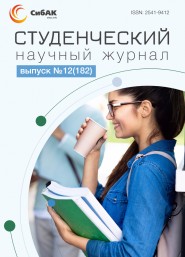Статья опубликована в рамках: Научного журнала «Студенческий» № 12(182)
Рубрика журнала: Информационные технологии
Скачать книгу(-и): скачать журнал часть 1, скачать журнал часть 2, скачать журнал часть 3, скачать журнал часть 4, скачать журнал часть 5, скачать журнал часть 6, скачать журнал часть 7
THE SPECIFICS OF EXTRACURRICULAR ACTIVITIES IN INFORMATICS FOR SCHOOLCHILDREN
ABSTRACT
This article examines the model of the information society and technology. The relevance of the importance of studying the subject of "informatics" in school education is revealed. The content and significance of extracurricular activities are described. The need for extracurricular activities for schoolchildren is actualized. The features of extracurricular activities to obtain the best learning outcomes are considered.
Keywords: information technology, extracurricular activities, computer science, Federal State Educational Standard.
In today's rapidly changing and actively developing world, we are provided with a variety of tools and opportunities for self-realization, self-determination, and the formation of our "I". In such a world, where great changes and transformations are taking place in all areas of our society, we are surrounded by gadgets and various types of information everywhere. In this regard, many new challenges arise, such as the correct use and application of devices, or other tasks in life that require innovative solutions.
It is modern school education, in particular computer science lessons, that forms an information culture and provides such an opportunity to learn how to timely and correctly find a way out of problem situations, for example: from using a computer to algorithmic thinking. After all, our education system is designed to reveal, guide, teach each child, bringing up a person who, after graduation, will be ready for life in a competitive and high-tech society.
As a result, with such a pace of life, in school education the volume for mastering knowledge is growing every year, and one of the school tasks is to convey knowledge to students clearly and interest them in the learning process. By solving this, extracurricular activities are introduced in schools, where classes for children are held with interest in a more playful format.
According to Sh.A. Amonashvili, "extracurricular activities are an integral part of the educational process of the school, one of the forms of organization of students' free time. Directions, forms, and methods of extracurricular (extracurricular) work practically coincide with the directions, forms and methods of additional education of children” [1].
Such classes can take the form of electives, competitions, quizzes that create conditions for informal communication of schoolchildren of the same class. At the same time the educational and socio-pedagogical orientation is expressed, which gives students the opportunity to receive not only in-depth knowledge of computer science but social experience that is useful in the information society. In such classes each student feels free, not tied to grades in a subject, while improving their creativity, imagination, and interest in research activities.
Such experience gained in extracurricular activities in computer science will help each student not only in acquiring new knowledge or in-depth studying but will also teach them how to apply skills in everyday life, regardless of the environment of use.
The features include: - classes are held on a voluntary basis for students;
- extracurricular activities set certain tasks and goals;
- clear, organized activities of classes (exact days, time);
- material in extracurricular activities is offered in accordance with the level of knowledge and skills of the group;
- classes can be scheduled depending on the conducting form, from 15 minutes to 1.5-2 hours;
- school students from different classes can attend such events;
- there are no homework assignments in such classes;
- the use of various forms and types of classes;
- use of game forms of conducting, competitive moments;
- equipment of the computer science cabinet, depending on the goals and objectives, with appropriate technical equipment;
- use of information technologies.
References:
- Amonashvili Sh.A., Personal and humane basis of the pedagogical process. - M., "University", 1990
- Bogomolova E.V. Theory and methodology of teaching and education of informatics [Electronic resource]
- Bochkin A.I. Methods of teaching informatics. - Minsk: Higher School, 1998. - 431 p.
- Karabanov A. Theory and methodology of teaching computer science [Electronic resource]
- Lapchik M.P. Methods of teaching informatics. – M.: Academy, 2001. – 624 p.
- Malev V.V. General methodology for teaching computer science. - Voronezh: VGPU, 2005. - 271 p.
- Malev V.V., Maleva A.A. Extracurricular work in informatics: Teaching aid for students of the Faculty of Physics and Mathematics. - Voronezh: VGPU, 2003. - 152 p.
- Sofronova N.V. Theory and methods of teaching informatics. - M.: Higher school, 2004. - 223 p.
- Suleimanov R.R. Extracurricular work in informatics at school - / R.R. Suleimanov // Pedagogical informatics. - 2002. - No. 4. - from. 13-20.
- Shmakova L.E. Methods of teaching informatics [Electronic resource]


Оставить комментарий